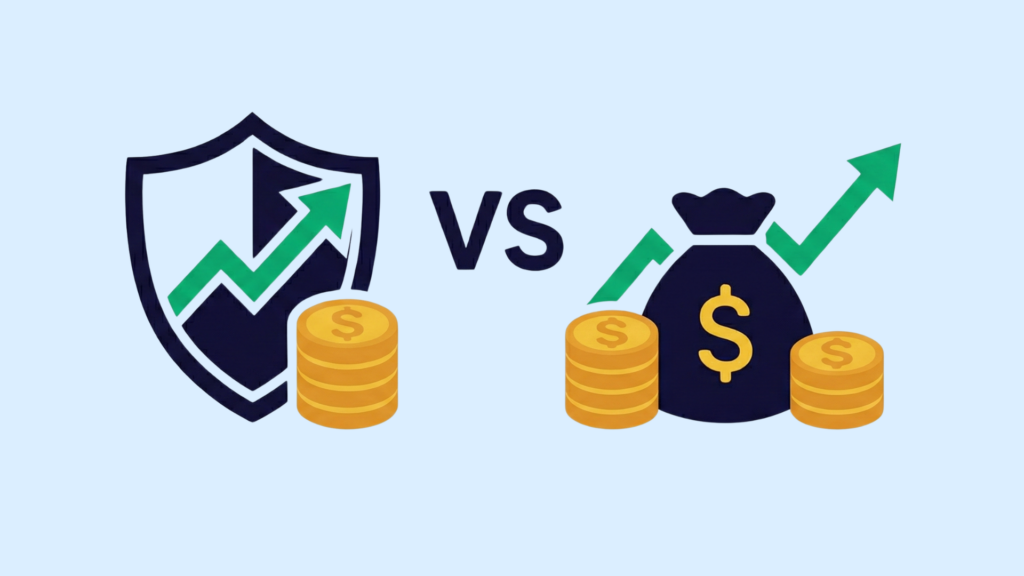A loan against mutual funds is one of the smartest ways to access liquidity without breaking your investments, but not everyone qualifies for it. Lenders have specific eligibility criteria based on your age, fund type, and investment profile.
In this blog, we’ll explain who can apply for a loan against mutual funds, the basic requirements, and what you need to qualify for quick approval.
What is a Loan Against Mutual Funds?
A loan against mutual funds is a secured loan that allows investors to borrow money by pledging their mutual fund units as collateral. Instead of redeeming your investments, you can access instant liquidity while your funds continue to earn market returns. This makes it a convenient solution for managing short-term financial needs without interrupting your long-term investment goals.
The loan amount is assessed by the current market value (NAV) of your mutual fund holdings, with lenders usually offering up to 50% for equity funds and 70-80% for debt funds.
Eligibility Criteria for Loan Against Mutual Funds
To qualify for a loan on mutual funds, you must meet certain general conditions set by banks or NBFCs:
- Age: Applicant must be at least 18 years old (some lenders may require a minimum of 21).
- Investor Type: Both resident Indians and NRIs can apply, depending on the lender policy.
- Mutual Fund Type:
- Both equity and debt mutual funds are eligible, though lenders prefer debt funds due to their lower volatility.
- The mutual fund scheme must be registered with CAMS or KFintech, the recognized registrars and transfer agents (RTAs).
- Income and Creditworthiness: Though income proof may not always be mandatory, having a steady income or good credit history helps in faster approval.
- Ownership: Only the primary holder of the mutual fund units can pledge them. Joint holders must provide NOCs or consent for pledging.
Minimum Holding Period for Mutual Fund Units
Most lenders do not require a minimum holding period to pledge mutual fund units for a loan. As long as the units are active and unencumbered (not pledged elsewhere), they can be used as collateral.
However, some lenders may prefer:
- Units that have been held for at least 6 months, especially in equity mutual funds, to ensure price stability.
- Funds with sufficient NAV value and consistent performance for easier valuation.
Documents and Procedures for Obtaining a Loan Against Mutual Funds
Getting a loan against mutual funds is a simple and largely digital process. Most banks and NBFCs now provide instant online loans via direct integration with RTAs.
Documents Required for a Loan on a Mutual Fund
The documentation process is minimal compared to traditional loans. Below are the standard documents typically required:
- 1. Identity Proof (any one):
- Aadhaar Card
- PAN Card
- Passport
- Voter ID
- 2. Address Proof (any one):
- Utility bill (electricity, gas, etc.)
- Passport
- Driving Licence
- Rent agreement
- 3. Income Proof (if required):
- Salary slips or bank statements (for salaried individuals)
- ITR or financial statements (for self-employed applicants)
- 4. Mutual Fund Details:
- Folio number and scheme name
- Latest mutual fund statement
- Statement of holdings from CAMS or KFintech
How to Get a Loan on Mutual Funds Online
Getting a loan against mutual funds online is now quick and hassle-free. Here’s how the process typically works:
- Visit the lender’s website or app: Choose a bank or NBFC that offers loans against mutual funds.
- Enter basic details: Provide your PAN, folio number, and select the registrar (CAMS or KFintech).
- Verify your holdings: The platform gets your mutual fund details instantly.
- Select the amount: Choose how much you want to borrow—up to 50–80% of your fund’s value.
- Pledge your units: Approve the electronic pledge request via your mutual fund account or RTA portal.
- Loan disbursal: Once verified, funds are credited to your bank account — often within a few hours to one business day.
Advantages of Taking an Instant Loan Against a Mutual Fund
A loan against mutual funds is one of the most convenient ways to access liquidity without disturbing your investments. It offers quick processing, competitive interest rates, and flexibility, making it ideal for short-term financial needs.
Unlike selling your mutual fund units, you retain ownership and continue benefiting from market growth while meeting your cash requirements.
Quick Disbursement of Funds
One of the biggest advantages of taking a loan against mutual funds online is the speed of disbursement. Most financial institutions now offer instant loan approvals through digital platforms that connect directly with mutual fund registrars.
How it works:
- You can apply online using your folio number or PAN.
- The lender verifies your holdings instantly through the RTAs (CAMS or KFintech).
- Once approved, the funds are disbursed within hours or a few business days to your bank account.
Ideal for:
- Meeting urgent financial needs, such as medical expenses, tuition fees, or business cash flow.
- Avoiding the delays and paperwork associated with traditional loans.
Lower Interest Rates Compared to Other Loans
Loan on mutual funds also has a lower interest rate, especially when compared to personal loans or credit cards.
The loan is secured, with your mutual fund units serving as collateral. This reduces the lender’s risk, allowing them to offer interest rates typically 2–4% lower than unsecured loans.
For example, personal loans may carry interest rates between 12% and 18% p.a, while loans against mutual funds often range from 8% to 11% p.a..
Risks and Limitations of a Loan Against Mutual Funds
While loans against mutual funds offer quick and affordable liquidity, they come with certain risks and conditions that borrowers should understand before applying.
If you fail to repay your loan against mutual funds within the agreed timeline:
- The lender has the right to liquidate (sell) your pledged mutual fund units to recover the outstanding amount.
- Defaulting can affect your credit score, which makes future borrowing more difficult.
- If the market value of your pledged funds drops, the lender may issue a margin call—asking you to either repay part of the loan or pledge extra units.
Conclusion
A loan against mutual funds is a flexible way to get liquidity without interrupting your investment journey. As long as you meet the basic eligibility criteria—being a verified investor with valid mutual fund holdings—you can easily access funds against your portfolio, often within hours.
However, it’s important to remember that this is still a secured loan, meaning your mutual fund units are at stake if repayments are delayed.
Frequently Asked Questions (FAQs)
Is it good to take a loan against a mutual fund?
Yes, taking a loan against mutual funds can be a good option if you need quick funds without liquidating your investments. It lets you retain market exposure and use your mutual fund units as collateral. However, it’s best for short-term needs, as a market downturn could impact your fund’s value and loan eligibility.
How much loan can be taken from a mutual fund?
You can typically borrow up to 50%–70% of the mutual fund’s value (depending on the fund type and lender policy).
- Equity mutual funds: Usually up to 50% of the value.
- Debt mutual funds: Up to 70%–80% of the value.
The exact limit depends on the lender’s evaluation and market conditions at the time of application.
Can I get a 20 lakh loan without collateral?
Yes, but not through mutual funds. If you’re looking for a 20 lakh loan without collateral, you’ll need to apply for a personal loan, which generally comes with higher interest rates and rigid eligibility criteria.
Is a loan against mutual funds better than a loan against an FD?
Both have their advantages, but a loan against mutual funds is often more flexible:
- You can apply online instantly with many lenders.
- Interest rates may be slightly higher than fixed deposits, but your funds continue to earn market returns.
- No pre-closure penalties with most lenders.
In contrast, a loan against an FD has lower interest rates but also locks your capital in fixed returns.
Disclaimer
The information provided in this article is for educational and informational purposes only. It should not be considered as financial or investment advice. Investing in stocks involves risk, and it is important to conduct your research and consult with a qualified financial advisor before making any investment decisions. The author and publisher are not responsible for any financial losses or gains that may result from the use of this information.























